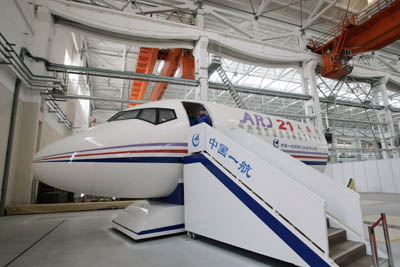New Chinese regional jet under assembly
(Xinhua)Updated: 2007-03-30 19:46
SHANGHAI -- Final assembly of the first Chinese developed commercial jet,the ARJ-21, began Friday morning in Shanghai with the first 90-seater plane expected to roll out of the workshop at the end of the year.
|
A full scale model of the first Chinese developed commercial jet, the
ARJ-21, is seen at Shanghai's Aircraft Manufacturing factory March 30,
2007. The regional jet, called the ARJ-21, will seat 70 to 100 people. The
plane's components have been produced at plants nationwide and taken to
Shanghai for final assembly. The first test flight of the prototype plane
will be March 2008. [Reuters] |
The ARJ-21's maiden flight is scheduled for March 2008 and mass production of the aircraft will begin in 2009, according to China Aviation Industry Corporation I (AVIC I), developer of the jet.
The market for the regional jet in China is expected to be around 700 by 2020, according to AVIC I.
"I am confident that the ARJ-21 will become the best regional jet in the world and give passengers a safe and comfortable flight experience," the ARJ-21's chief designer, Wu Guanghui, told Xinhua.
The aircraft components are manufactured in Xi'an, Shenyang and Chengdu and then freighted to a large workshop at the Shanghai Aircraft Manufacturing Factory (SAMF) for assembly.
A larger workshop -- with enough space to assemble five ARJ-21s simultaneously -- will come onstream in May. The Shanghai plant will then be able to produce 50 regional jets a year, said SAMF president Wang Wenbin.
Begun in 2002, the ARJ-21 project brings together eight domestic aviation companies and 19 international component suppliers. Its wings and fuselage are produced in Xi'an, the nose section is made in Chengdu and the tail section in Shenyang, according to Wu.
The ARJ-21 passenger cabin will be 3.14 meters wide and 2.06 meters high with 70 to 110 seats. It will fly at a maximum 39,000 feet and can travel up to 3,700 kilometers without refueling.
The first jet is expected to be delivered to the Shandong Aviation Group in the third quarter of 2009, according to AVIC I.
AVIC I has already received 71 orders for the aircraft. The buyers include leading regional airlines such as Shanghai Airlines Co. and Shandong Aviation Group and some aircraft leasing companies have also signed letters of intent to buy the aircraft, said AVIC I general manager Zheng Qiang.
The ARJ-21 project has also helped Chinese experts and technicians improve management and marketing skills for large aircraft development, said Zhang Ju'en, head of AVIC I's Department of Science and Technology Development.
"The ARJ-21 is China's most advanced commercial aircraft manufacturing project. It is an important test for China before it develops its own jumbo aircraft," said Zhang.
Chinese experts said early this month that the country's dream of having a self-developed jumbo aircraft will come true by 2020 if everything goes well.
A jumbo aircraft is an airfreighter with a take-off weight of more than 100 tons or an airliner with more than 150 seats.
Only the United States, Russia, France, Germany, Britain and Spain currently have the ability to build jumbo aircraft, with Boeing and Airbus taking the lion's share of the international market.
China is on track to become the world's second largest civil aviation market by 2030 -- after the United States -- with air travel soaring by more than 95 percent in the past five years.
Huge market demand means that China will need 1,600 new airliners by 2020, representing expenditure of at least US$150 billion.
|
||
|
||
|
|

